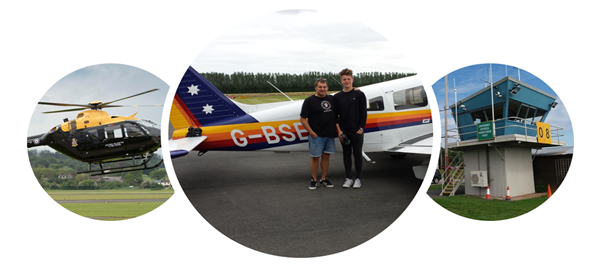My Cranfield MSc: Astronautics and Space Engineering – Pathway to space.
23/02/2021

Where did it all start? How did I become interested in the space sector? I would say that my interest in aerospace originated from my passion for aircraft and helicopters from an early age. I remember I did my high school work experience shadowing an RAF helicopter pilot and was lucky enough to get a few flights with him in the Eurocopter Squirrel HT1 from the Defence Helicopter Flying School out of RAF Shawbury back in 2014.
From then, I developed a real passion towards flying and really wanted to become a fast jet pilot in the RAF. Due to this interest, I took up flying lessons from my local airfield when I was 16 and managed to do my first solo flight before the time I got my driving licence! As I was spending so much time at the airfield, I managed to pick up a part-time job there where I started off as an Air Traffic Service Assistant in the tower.
I continued with this job through college, progressing to an Air Ground Controller after obtaining my Radio Operators Certificate of Competence (ROCC) from the Civil Aviation Authority in 2017 to operate VHF radiotelephony equipment and exchange spoken messages in the aeronautical radio services.
In terms of academia, my strongest subjects were maths and physics, which ultimately lead me to study this combination in college as well, as well as psychology, physical education and an Extended Project Qualification (EPQ) looking into lift generation and aerofoil characteristics. This ultimately then led me to study my BEng in Aerospace Engineering with Pilot Studies down in Bristol.

I only really started to specialise in space flight during my final year, choosing to tailor my elective modules towards spacecraft engineering, which gave me valuable experience in simulation exercises on geometric orbit design, mission and spacecraft systems engineering using the Open Cosmos beeApp simulator as well as analysis of radiation dosage on shielding thickness and spacecraft mean body temperature with the STK Space Environment and Effects Tool.
As my personal interests are within space flight and rocket propulsion systems, this led me to do my final year individual project on an exploration of the design of liquid bi-propellent engines, with a practical investigation into the combustion phase using CFD. For those who don’t know what CFD is, it is Computational Fluid Dynamics, and engineers use it to model fluid flow to simulate real life applications. In my case, this was the chemical reaction of various combinations of fuels and oxidisers and see how they affected the performance of the engine, the specific impulse. I then took this further, and am now studying Astronautics and Space Engineering MSc at Cranfield University.
Categories & Tags:
Leave a comment on this post:
You might also like…
From classroom to cockpit: What’s next after Cranfield
The Air Transport Management MSc isn’t just about learning theory — it’s about preparing for a career in the aviation industry. Adit shares his dream job, insights from classmates, and advice for prospective students. ...
Setting up a shared group folder in a reference manager
Many of our students are now busy working on their group projects. One easy way to share references amongst a group is to set up group folders in a reference manager like Mendeley or Zotero. ...
Company codes – CUSIP, SEDOL, ISIN…. What do they mean and how can you use them in our Library resources?
As you use our many finance resources, you will probably notice unique company identifiers which may be codes or symbols. It is worth spending some time getting to know what these are and which resources ...
Supporting careers in defence through specialist education
As a materials engineer by background, I have always been drawn to fields where technical expertise directly shapes real‑world outcomes. Few sectors exemplify this better than defence. Engineering careers in defence sit at the ...
What being a woman in STEM means to me
STEM is both a way of thinking and a practical toolkit. It sharpens reasoning and equips us to turn ideas into solutions with measurable impact. For me, STEM has never been only about acquiring ...
A woman’s experience in environmental science within defence
When I stepped into the gates of the Defence Academy it was the 30th September 2019. I did not know at the time that this would be the beginning of a long journey as ...






